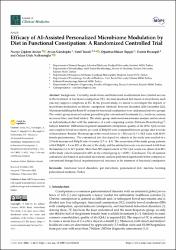| dc.contributor.author | Arslan, Naciye Çiğdem | |
| dc.contributor.author | Gündoğdu, Aycan | |
| dc.contributor.author | Tunalı, Varol | |
| dc.contributor.author | Topgül, Oğuzhan Hakan | |
| dc.contributor.author | Beyazgül, Damla | |
| dc.contributor.author | Nalbantoğlu, Özkan Ufuk | |
| dc.date.accessioned | 2022-12-09T11:54:00Z | |
| dc.date.available | 2022-12-09T11:54:00Z | |
| dc.date.issued | 2022 | en_US |
| dc.identifier.citation | Arslan, N. Ç., Gündoğdu, A., Tunalı, V., Topgül, O. H., Beyazgül, D. ve Nalbantoğlu, Ö. U. (2022). Efficacy of AI-assisted personalized microbiome modulation by diet in functional constipation: A randomized controlled trial. Journal of Clinical Medicine, 11(22). https://doi.org/10.3390/jcm11226612 | en_US |
| dc.identifier.issn | 2077-0383 | |
| dc.identifier.uri | https://doi.org/10.3390/jcm11226612 | |
| dc.identifier.uri | https://hdl.handle.net/20.500.12511/10105 | |
| dc.description.abstract | Background: Currently, medications and behavioral modifications have limited success in the treatment of functional constipation (FC). An individualized diet based on microbiome analysis may improve symptoms in FC. In the present study, we aimed to investigate the impacts of microbiome modulation on chronic constipation. Methods: Between December 2020–December 2021, 50 patients fulfilling the Rome IV criteria for functional constipation were randomized into two groups. The control group received sodium picosulfate plus conventional treatments (i.e., laxatives, enemas, increased fiber, and fluid intake). The study group underwent microbiome analysis and received an individualized diet with the assistance of a soft computing system (Enbiosis Biotechnology®, Sariyer, Istanbul). Differences in patient assessment constipation–quality of life (PAC-QoL) scores and complete bowel movements per week (CBMpW) were compared between groups after 6-weeks of intervention. Results: The mean age of the overall cohort (n = 45) was 31.5 ± 10.2 years, with 88.9% female predominance. The customized diet developed for subjects in the study arm resulted in a 2.5-fold increase in CBMpW after 6-weeks (1.7 vs. 4.3). The proportion of the study group patients with CBMpW > 3 was 83% at the end of the study, and the satisfaction score was increased 4-fold from the baseline (3.1 to 10.7 points). More than 50% improvement in PAC-QoL scores was observed in 88% of the study cohort compared to 40% in the control group (p = 0.001). Conclusion: The AI-assisted customized diet based on individual microbiome analysis performed significantly better compared to conventional therapy based on patient-reported outcomes in the treatment of functional constipation. | en_US |
| dc.language.iso | eng | en_US |
| dc.publisher | MDPI | en_US |
| dc.rights | info:eu-repo/semantics/openAccess | en_US |
| dc.rights | Attribution 4.0 International | * |
| dc.rights.uri | https://creativecommons.org/licenses/by/4.0/ | * |
| dc.subject | Functional Bowel Disorders | en_US |
| dc.subject | Gut Microbiota | en_US |
| dc.subject | Personalized Diet | en_US |
| dc.subject | Machine Learning | en_US |
| dc.subject | Personalized Medicine | en_US |
| dc.subject | Turkey | en_US |
| dc.title | Efficacy of AI-assisted personalized microbiome modulation by diet in functional constipation: A randomized controlled trial | en_US |
| dc.type | article | en_US |
| dc.relation.ispartof | Journal of Clinical Medicine | en_US |
| dc.department | İstanbul Medipol Üniversitesi, Tıp Fakültesi, Cerrahi Tıp Bilimleri Bölümü, Genel Cerrahi Ana Bilim Dalı | en_US |
| dc.authorid | 0000-0002-2282-7207 | en_US |
| dc.authorid | 0000-0002-6292-890X | en_US |
| dc.identifier.volume | 11 | en_US |
| dc.identifier.issue | 22 | en_US |
| dc.relation.publicationcategory | Makale - Uluslararası Hakemli Dergi - Kurum Öğretim Elemanı | en_US |
| dc.identifier.doi | 10.3390/jcm11226612 | en_US |
| dc.institutionauthor | Arslan, Naciye Çiğdem | |
| dc.institutionauthor | Topgül, Oğuzhan Hakan | |
| dc.identifier.wosquality | Q2 | en_US |
| dc.identifier.wos | 000887479600001 | en_US |
| dc.identifier.scopus | 2-s2.0-85142643806 | en_US |
| dc.identifier.pmid | 36431088 | en_US |
| dc.identifier.scopusquality | Q1 | en_US |



















